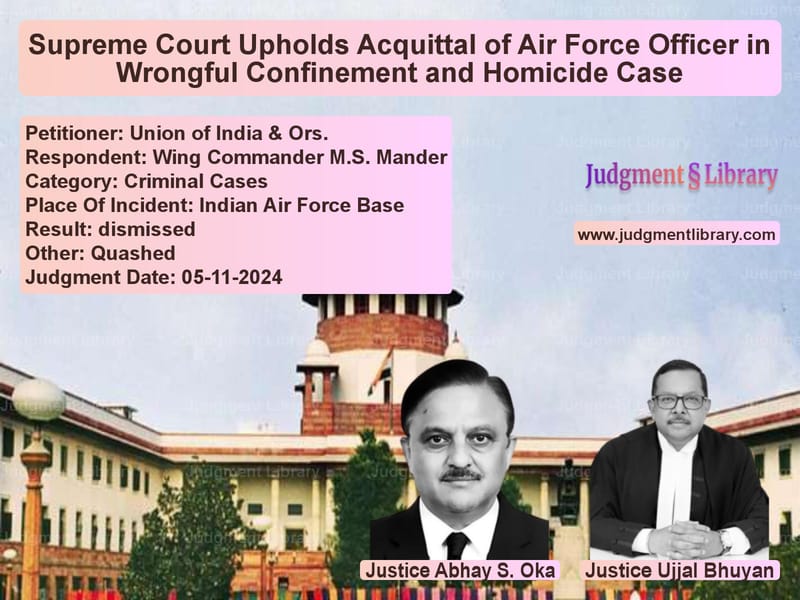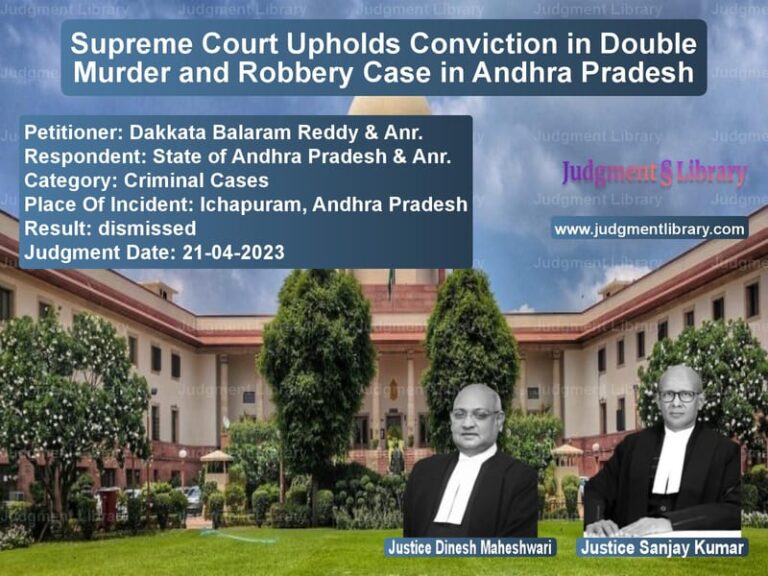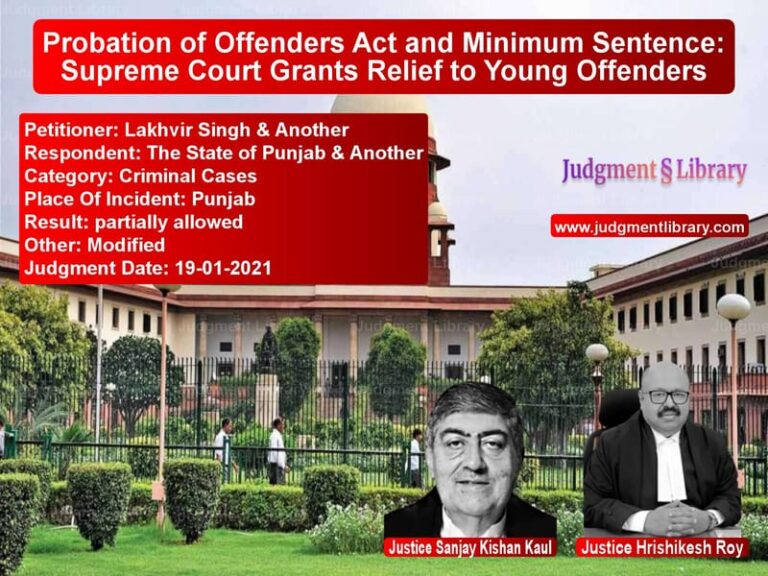Supreme Court Upholds Acquittal of Air Force Officer in Wrongful Confinement and Homicide Case
The case of Union of India & Ors. vs. Wing Commander M.S. Mander involves the acquittal of an Air Force officer who was charged with multiple offenses, including wrongful confinement and culpable homicide, following the death of a signalman under custody. The Supreme Court of India, in its judgment dated November 6, 2024, upheld the decision of the Armed Forces Tribunal, which had set aside the officer’s conviction and reinstated him with consequential benefits.
Background of the Case
The case originated from an incident on March 6, 1998, where signalman U.D. Garje, an Army personnel, allegedly misbehaved with the wife of Flight Lieutenant S. Verma. The matter was reported to Wing Commander M.S. Mander, the station commander, who directed an inquiry into the allegations. The deceased was later brought to the base for questioning, but while being transported in a Gypsy vehicle, he jumped from the moving vehicle and sustained fatal injuries.
A General Court Martial (GCM) was convened, and the officer, along with four others, was charged under various sections of the Indian Penal Code (IPC) and the Air Force Act, 1950. The charges included:
- Section 302 IPC (murder) read with Section 149 IPC (unlawful assembly).
- Section 304 Part II IPC (culpable homicide not amounting to murder).
- Section 325 IPC (voluntarily causing grievous hurt).
- Section 342 IPC (wrongful confinement).
- Sections 45, 65, and 71 of the Air Force Act, 1950 (indiscipline and prejudicial conduct).
The GCM convicted the officer under Section 304 Part II IPC and sentenced him to five years of rigorous imprisonment along with cashiering (dismissal from service). The Chief of the Air Staff, while confirming the conviction, reduced the imprisonment to two years but upheld the cashiering. The officer challenged his conviction before the Armed Forces Tribunal, which overturned the GCM’s decision, leading to the present appeal by the Union of India.
Key Legal Issues
- Whether the officer’s actions amounted to wrongful confinement and culpable homicide.
- Whether the Tribunal correctly assessed the evidence while overturning the conviction.
- Whether the officer’s acquittal should be upheld in light of the prosecution’s evidence.
Petitioner’s Arguments
The Union of India, represented by its counsel, argued:
- The Tribunal erred in setting aside the officer’s conviction despite clear evidence of his involvement.
- Multiple prosecution witnesses had testified that the officer played an active role in detaining the deceased.
- Medical evidence suggested that the injuries sustained by the deceased were consistent with assault rather than an accidental fall.
- The officer’s statement before the GCM indicated that he had ordered the deceased’s confinement, which led to his death.
Respondent’s Arguments
Wing Commander M.S. Mander countered with the following points:
- There was no evidence proving that the officer or any co-accused assaulted the deceased.
- The deceased voluntarily jumped out of the moving vehicle and sustained fatal injuries.
- The Tribunal had correctly analyzed the evidence and found no direct link between the officer’s actions and the death of the deceased.
- The prosecution failed to establish the elements of wrongful confinement or culpable homicide.
Supreme Court’s Observations
The Supreme Court carefully reviewed the prosecution’s evidence, the findings of the GCM, and the Tribunal’s decision. It made the following key observations:
1. Lack of Direct Evidence
The Court found no direct evidence proving that the officer had inflicted injuries upon the deceased. The judgment stated:
“The prosecution failed to establish beyond reasonable doubt that the accused physically harmed the deceased. The injuries were consistent with a fall, and there is no conclusive proof of assault.”
2. No Evidence of Wrongful Confinement
The Court noted that while the officer had initially directed that the deceased be taken to the Guards’ room, he later changed his mind and agreed to have him identified by the complainant’s wife before proceeding further. The judgment emphasized:
Read also: https://judgmentlibrary.com/supreme-court-acquits-man-in-1989-murder-case-due-to-lack-of-evidence/
“A mere instruction to take someone to the Guards’ room, which was never executed, does not amount to wrongful confinement under Section 342 IPC.”
3. Medical Evidence Supports Accidental Fall
The autopsy report confirmed that the deceased suffered severe head trauma, which was consistent with falling from a moving vehicle. The Court observed:
“There is no evidence that the accused used force or pushed the deceased from the vehicle. The injuries were caused by the fall itself, which was an act of the deceased.”
4. High Standard for Reversing Acquittals
The Court reiterated that an order of acquittal enhances the presumption of innocence and cannot be overturned without strong reasons. It cited established legal principles:
“An acquittal cannot be interfered with merely because an alternative view is possible. The Tribunal’s findings are reasonable and do not warrant interference.”
Final Judgment
The Supreme Court upheld the Tribunal’s decision and ruled:
- The respondent’s conviction was correctly set aside.
- The charges under Sections 304 Part II, 342 IPC, and the Air Force Act were not proven.
- The officer was entitled to reinstatement with full benefits, except for back wages.
- The appeal by the Union of India was dismissed.
Impact of the Judgment
This ruling has significant implications for military justice and the standard of proof required in criminal trials involving defense personnel. The judgment ensures:
- High evidentiary standards are maintained in courts-martial proceedings.
- Officers cannot be convicted based on mere suspicion or circumstantial evidence.
- The Armed Forces Tribunal’s role in ensuring fair trials is upheld.
- Wrongful confinement must meet strict legal criteria before conviction.
By upholding the acquittal, the Supreme Court has reinforced the principle that disciplinary actions in the military must be based on clear and convincing evidence, ensuring fairness and justice for all personnel.
Petitioner Name: Union of India & Ors..Respondent Name: Wing Commander M.S. Mander.Judgment By: Justice Abhay S. Oka, Justice Ujjal Bhuyan.Place Of Incident: Indian Air Force Base.Judgment Date: 05-11-2024.
Don’t miss out on the full details! Download the complete judgment in PDF format below and gain valuable insights instantly!
Download Judgment: union-of-india-&-ors-vs-wing-commander-m.s.-supreme-court-of-india-judgment-dated-05-11-2024.pdf
Directly Download Judgment: Directly download this Judgment
See all petitions in Custodial Deaths and Police Misconduct
See all petitions in Bail and Anticipatory Bail
See all petitions in Attempt to Murder Cases
See all petitions in Judgment by Abhay S. Oka
See all petitions in Judgment by Ujjal Bhuyan
See all petitions in dismissed
See all petitions in Quashed
See all petitions in supreme court of India judgments November 2024
See all petitions in 2024 judgments
See all posts in Criminal Cases Category
See all allowed petitions in Criminal Cases Category
See all Dismissed petitions in Criminal Cases Category
See all partially allowed petitions in Criminal Cases Category







